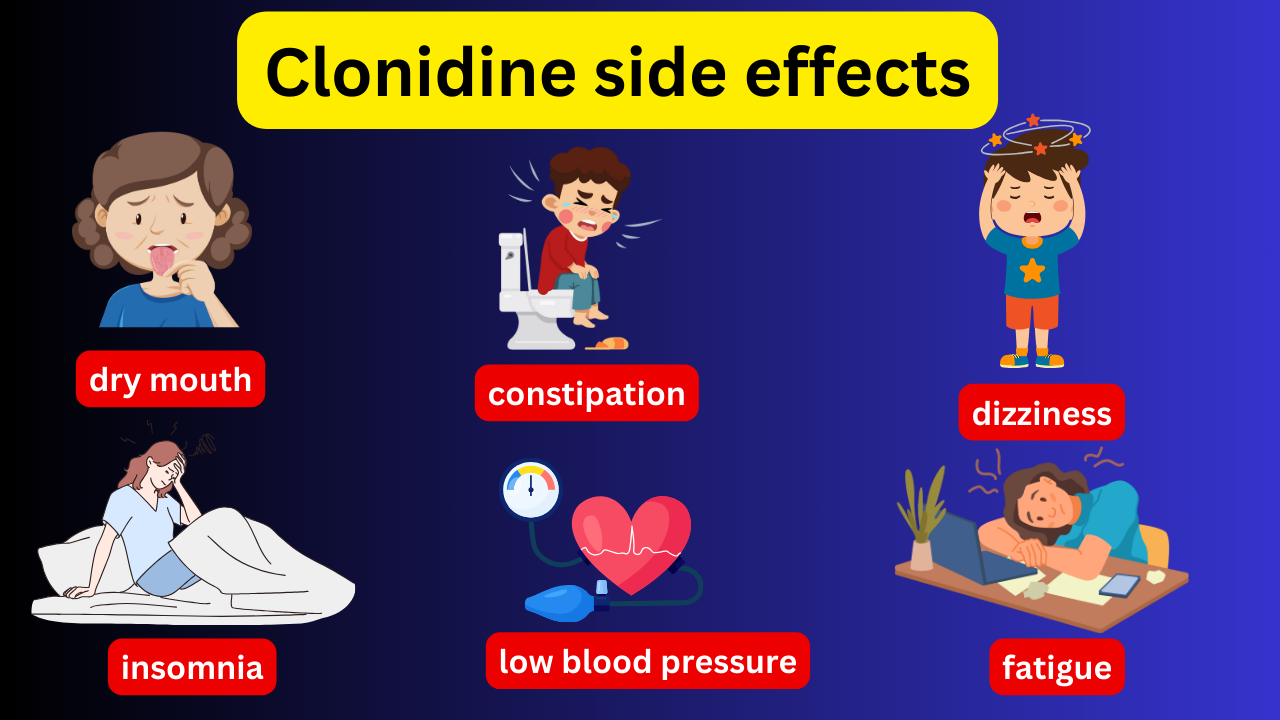Introduction
Welcome to the ultimate guide on Clonidine, a medication that holds the potential to enhance your well-being and contribute to a better quality of life. In this comprehensive blog post, we’ll explore what Clonidine is, how it works, its various uses, potential side effects, and tips for a healthier lifestyle while using this medication.
Understanding Clonidine
It is a medication primarily known for its ability to treat conditions like high blood pressure and ADHD (Attention Deficit Hyperactivity Disorder). It belongs to a class of drugs called centrally acting alpha-agonists, working by stimulating certain receptors in the brain to reduce nerve signals that lead to elevated blood pressure.

How Clonidine Works
It works by binding to alpha-2 adrenergic receptors in the brain, which leads to a decrease in the release of norepinephrine, a neurotransmitter. The reduction in norepinephrine levels results in a decrease in sympathetic nervous system activity, leading to lowered blood pressure and a calming effect on the central nervous system.
Uses of Clonidine
1. Hypertension Management:
It is widely prescribed to control high blood pressure. By regulating nerve signals, it helps relax blood vessels, allowing blood to flow more easily and causing low blood pressure.

2. ADHD Treatment:
It is also used as an alternative or adjunct treatment for ADHD, especially when stimulant medications are not well-tolerated or ineffective. It helps manage impulsivity and hyperactivity.

3. Anxiety and Sleep Disorders:
In some cases, it may be prescribed off-label to alleviate symptoms of anxiety and sleep disorders. Its calming effect on the central nervous system can contribute to better sleep and reduced anxiety levels.

Tips for a Healthier Lifestyle with Clonidine
1. Consistent Medication Schedule:
Take this medicine at the same time each day to maintain a steady level in your bloodstream. This consistency enhances its effectiveness in managing blood pressure and other conditions.

2. Regular Blood Pressure Monitoring:
Keep track of your blood pressure regularly, especially in the initial stages of it’s use. This helps your healthcare provider adjust the dosage if needed.

3. Stay Hydrated:
Drinking an adequate amount of water is essential when using Clonidine. Proper hydration supports the medication’s effectiveness and helps prevent potential side effects like dry mouth.

4. Avoid Alcohol and Sedatives:
It can amplify the effects of alcohol and sedatives, leading to excessive sedation. It’s advisable to limit or avoid the consumption of alcohol and sedative medications while on Clonidine.

5. Healthy Lifestyle Choices:
Incorporate a balanced diet, regular exercise, and stress-reducing activities into your routine. These lifestyle choices complement the effects of this medicine, contributing to overall well-being.

Potential Side Effects
While it is generally well-tolerated, some individuals may experience side effects, including:
Dry mouth
Fatigue
Dizziness
Constipation
Low blood pressure
Difficulty in sleeping
It’s crucial to communicate any unusual or severe side effects to your healthcare provider promptly.

Navigating Challenges:
While this medicine holds significant promise for enhancing well-being, it’s essential to be aware of potential challenges and address concerns proactively. Open communication with your healthcare provider is key to ensuring a positive experience with this medication.
1. Managing Side Effects:
If you encounter side effects such as dry mouth, fatigue, or dizziness, don’t hesitate to discuss these with your healthcare provider. Adjustments to your Clonidine dosage or additional strategies can often help alleviate these symptoms.

2. Blood Pressure Variations:
Regular monitoring of your blood pressure is crucial, but occasional variations are normal. If you notice consistent changes or experience symptoms like lightheadedness, notify your healthcare provider promptly.

3. Individualized Treatment Plans:
Everyone responds differently to medications. Your healthcare provider will tailor your It’s treatment plan based on your specific health needs and response. Be proactive in sharing your experiences to fine-tune your treatment for optimal results.

4. Avoid Abrupt Discontinuation:
It’s important to follow your healthcare provider’s guidance when it comes to stopping Clonidine. Abrupt discontinuation can lead to a rapid increase in blood pressure, so any adjustments should be made under professional supervision.

5. Emotional Well-being:
It may be prescribed for anxiety, but it’s essential to address the holistic aspects of mental health. Incorporating stress management techniques, counseling, or therapy into your routine can complement the medication’s effects.

FAQs About Clonidine:
Can I take Clonidine with other medications?
Ensure that you consistently communicate with your healthcare provider regarding the complete list of medications and supplements you are currently using. Clonidine may interact with certain drugs, and your healthcare provider can guide you on potential adjustments.
Is Clonidine habit-forming?
Clonidine is not considered habit-forming. However, it’s crucial to take it as prescribed and not adjust the dosage without consulting your healthcare provider.
Can I use Clonidine during pregnancy or while breastfeeding?
It’s essential to discuss the potential risks and benefits with your healthcare provider if you are pregnant or breastfeeding. They can help weigh the options and determine the safest course of action for you and your baby.
What is the typical duration for Clonidine to take effect?
The commencement of Clonidine’s impact may differ from individual to individual. Your healthcare professional will assess your response and make necessary modifications accordingly.
Conclusion: A Holistic Approach to Better Living
In embracing the benefits of Clonidine, it’s crucial to adopt a holistic approach to better living. This involves not only understanding the medication’s mechanisms but also addressing individual needs, and concerns, and maintaining open communication with healthcare providers.
By incorporating healthy lifestyle choices, managing potential side effects, and seeking support when needed, you can unlock the full potential of Clonidine on your journey to a healthier and more fulfilling life.
Remember, your healthcare provider is your ally in this journey, guiding you towards optimal well-being. As you explore the possibilities that Clonidine offers, may it be a catalyst for positive change and a key player in your pursuit of a better and more balanced life.


